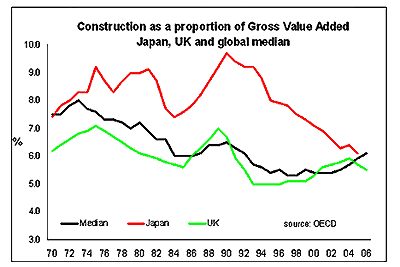How bad will deflation be for UK construction?
The talk now is not of inflation but deflation.
The latest inflation figures showed a fall for the first time in 15 months and the Prime Minister chided the opposition with the line that if this year was about inflation next year is about deflation.
But what would it mean for construction?
Well that is a tough one to answer because so much depends on the extent to which the Government uses the industry as a tool to lift the economy out of its torpor.
Certainly deflation, as house builders are currently too aware can be a nasty business. Who wants to buy a house today when it will be 20% cheaper in a year or two?
Commercial building could be equally hit as the value of land and buildings fall, though the equation here is more complex.
For employment it is bad news. Even if wages in cash terms remain level, to employers the wage bill in real terms rises. So workers are shed.
For construction the effect would most likely be a shift from direct to indirect labour, which allows more flexibility in setting wage costs.
On the public building side the question becomes: How deep is the public pocket? Construction spending could be seen as a mechanism to boost economic activity.
I am sure the theorists both Keynesian inspired and those of the Austrian school will argue over the implications and the potential costs or benefits of any remedies.
But I have put together a graph that you can interpret for yourself. The figures are taken from the OECD and show the proportion of the total value added to the economy that came from construction over each year from 1970 to 2006.
It compares Japan which suffered deflation after the 1980s construction boom burst with the UK and a median value for a basket of other nations.
To me it suggests that construction and deflation are not the best of bedfellows, but that is just from a simple glance at the graph.
